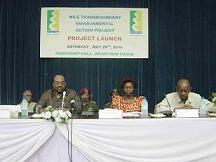African states launch ambitious project on management of River Nile
by Ssekandi Ronald, Chen Cailin.
 Sept 6, 2005 (Kampala) — African states along the River Nile have launched an ambitious 15 million US dollar project to provide a cooperative framework for the development and management of the Nile water resources.
Sept 6, 2005 (Kampala) — African states along the River Nile have launched an ambitious 15 million US dollar project to provide a cooperative framework for the development and management of the Nile water resources.
A statement issued by the Nile Basin Initiative (NBI) secretariat on Monday to mark the launch of the six-year project dubbed “Confidence Building and Stakeholders Initiative (CBSI),” said that the main objective of the project is to increase public awareness and stakeholders involvement in the River Nile water resources.
The NBI is a partnership initiated and led by riparian states of the River Nile, including Burundi, the Democratic Republic of the Congo, Egypt, Ethiopia, Kenya, Rwanda, Sudan, Tanzania, Uganda and Eritrea, also called Nile Basin states.
The 6,695 km River Nile is the world’s longest river. It stretches from central Africa to the Nile delta where it joins the Mediterranean Sea.
CONCERNS SURROUNDING THE RIVER NILE
CBSI comes at the time when there is increasing concern over the development and management of the Nile waters.
In a recent interview with Xinhua, the President of the African Ministers Council on Water and Uganda’s minister of state for water, Maria Mutagamba said that there is need to involve all the stakeholders especially investors in the proper management of the Nile waters.
She noted that private companies along the Nile should play a big role in protecting the waters since they use it a lot but do little to protect the resource.
“Many of these companies earn a lot of money from the Nile water resource but do not care to protect it. Many of them instead pollute the resource. Therefore these people must be greatly involved in the management and development of the river,” said Mutagamba.
Water which has now become a tradable commodity is expensive for many poor people in the Nile basin. In urban areas, the up- front costs of connection are beyond their reach while those who can afford the connection can sell the water, sometimes 20 times the price they pay for it.
Without the easy access to clean water, basic cleanliness and hygiene becomes unaffordable to the poorest in the region. Diseases such as cholera, typhoid and dysentery are some of the health prices the poor have to pay.
The rapid population growth, currently estimated at about 200 million depend on the waters for livelihood, and the number is likely to double by 2025, couple with the agitation for industrialization and urbanization continue to exert pressure on the Nile.
In a recent study on Lake Victoria, which is one of the main sources of the Nile, deadly chemicals were found in the water.
AWARENESS CAMPAIGN
The CBSI is eyeing an awareness campaign to address the concerns.
According to NBI, the CBSI will provide an avenue for participation of a wide variety of stakeholders including the local communities in the basin.
Under the confidence building component, the CBSI will undertake strategically targeted tasks of building confidence between the riparian states.
According to NBI, this will be accomplished through activities and exchanges across the borders that build trust and lead to development of bilateral and regional partnerships.
The NBI has also adopted stakeholder participation at the country level as a high priority. The Stakeholder Involvement Component aims to facilitate broad-based participation in the NBI and its projects through training, workshops and working with government ministries to establish formal participation mechanisms.
The NBI has also established a regional unit based at the NBI secretariat, two sub-regional offices housed in Ethiopia and Uganda, and CBSI national implementation offices in the 10 riparian countries. These offices will help in the coordination of the activities of the CBSI.
Other activities that the CBSI will carry out will be to conduct a public opinion survey to engage the public and create forums of dialogue on the management of the Nile waters. This will be one of the ways of increasing on the awareness on the proper management of the water body.
CHALLENGES
The CBSI faces a major challenge of making the local population own the program of protecting a conserving the river. There should be a clear network right from the NBI Secretariat down to the local communities. Once this network is established then it will be easy to implement various programs aimed at the development and the management of the Nile water resources.
This will in the long run strengthen NBI’s efforts to share benefits that can be derived from the Nile, including increased agricultural and power production and trade, as well as improved environmental and water resources management and more productive fisheries.
The Nile Basin Initiative (NBI) is a regional partnership, among the basin states of the Nile, which provides a forum for cooperative development of the water resources of the Nile River. The Shared Vision Program (SVP), one of the two major Programs within the Nile Basin , is a basin wide, grant funding collaborative action, exchange of information and training. SVP includes eight projects, seven of these are thematic projects related to environment, power trade, agriculture, water resources planning and management, applied training, confidence building and stakeholder involvement, and benefit sharing.
